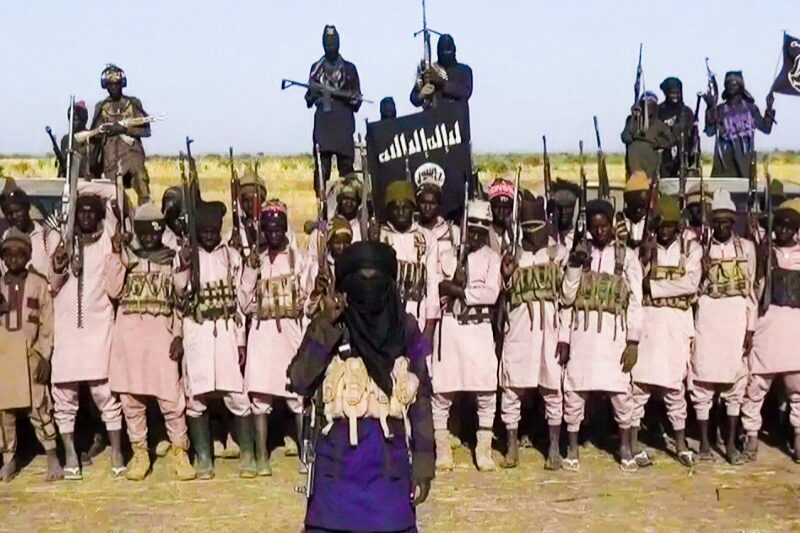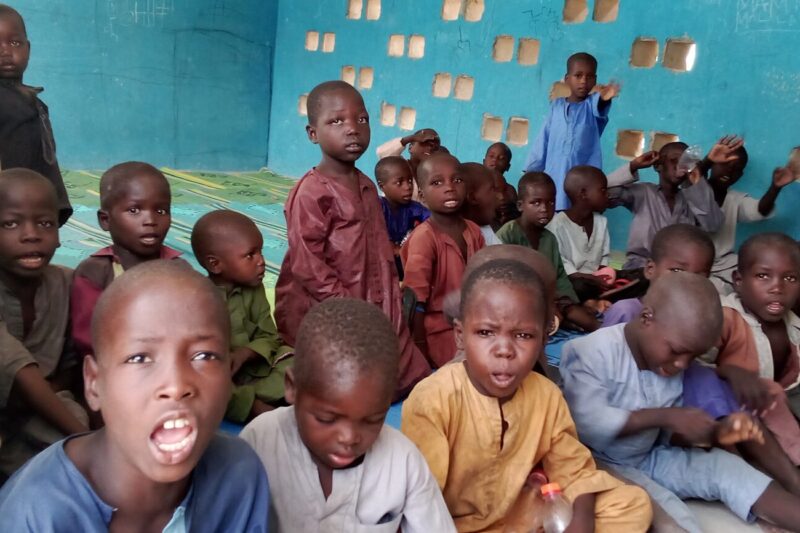Insurgents confront Borno State farmers daily, allowing them on their lands only if they pay a ‘tax’ – if they refuse, they are attacked, killed, wounded or kidnapped.
Farmers in Borno State are being terrorised by heavily armed insurgents who refuse to allow them on to their lands unless they pay “taxes” – and, if they don’t, they are shot.
They say they look death in the face every day.
Insurgents – belonging to either the Jamā’at Ahl as-Sunnah lid-Da’way Wa’l-Jihād (JAS), more commonly referred to as Boko Haram, or the Islamic State West Africa Province (ISWAP) – usually arrive on motorbikes, brandishing semi-automatic rifles and other firearms – as well as knives.
Many wear masks to obscure their identity.
They “allow” farmers on to their lands only if they pay “taxes”. If farmers refuse, they are often killed on the spot. Otherwise, the farmers are kidnapped and the insurgents demand “huge ransoms” for their release.
If family members, friends and neighbours cannot raise the money, the farmers are often killed.
“The insurgents also take all our valuables, including mobile phones, wrist watches, money and bicycles, as well as equipment and produce,” said Ba Godu Ari (not his real name), a farmer from Gajiganna town in the Magumeri Local Government Area.
He is one of many farmers from agrarian communities in Magumeri, Nganzai, Dikwa and Damboa, who say insurgents are making their lives a living hell.
“Because of all the rain this year, we are all expecting a bumper harvest. But we are terrified of going to our lands because there is a good chance we will end up dead – or kidnapped,” Ari said.
“If you don’t pay ‘taxes’, insurgents refuse to allow you on to your land. We invest a huge amount of money on seeds and farming equipment. There’s no money for taxes which can cost as much as ₦30,000.
“If you are kidnapped, the insurgents demand a ransom of anything from ₦400,000 to ₦600,000 – sometimes even more.
“Farming is our only means of making a living. That is the only way we survive. So we do not have a choice. We are forced to pay the taxes so that we can at least harvest some of our crops – although we know the insurgents will take their share.”
Ari and other farmers who spoke to RNI said they were begging the Borno State government to provide better security to stop the persistent attacks.
“More farmers will die or get kidnapped if the government does not beef up security,” said Ari.
Bor Modu Borbe (not his real name), a farmer from Gajiram town in the Nganzai Local Government Area, said the harvest period was one of the most challenging times.
“The attacks, killings and abductions do not stop. Insurgents come in groups. Often one group will demand tax money from you and you pay. Then, later on that same day, another group will surround you and demand tax money. It does not help if you tell them you have already paid. They don’t listen. They don’t care.
“They ask us what we are going to do with all the produce. Then they tell us they need it more than we do. They just take what they want.”
Borbe said the insurgents often raid agrarian communities and villages in and around Gajiram town.
“They order community leaders and traditional rulers to collect tax from their subjects. They tell them that their communities will be attacked if their orders are not obeyed. So, the leaders do what they are told.”
Malum Mala Zawama has a farm in the Dikwa Local Government Area of Borno State.
“Just before the wet season begins, when we need to start clearing our land so that we can plant seeds, the insurgents demand at least ₦5,000 from each farmer. They call it tax but there is no such thing. They are just stealing our money.
“Then, as the harvesting period approaches, the insurgents demand tax of at least ₦15,000. We are not allowed on to our lands if we refuse to pay. The insurgents also take much of our produce for themselves. Sometimes we are left with food for our families and hardly anything to sell at the market.
“Most of our crops and plants are ripe now and almost ready for harvest. But we are afraid to go to our land because of the frequent attacks and kidnappings. We also do not have money to pay the tax.
“Many farmers choose to stay at home because they just do not have money to pay the tax. It’s better to be safe than sorry.”
Sule Maina, a farmer from the Damboa Local Government Area, described insurgents as brutes and robbers.
“They not only take our money and produce, they steal valuables, such as mobile phones, watches and bicycles – also farm equipment.
“Before the season began, the insurgents stopped us from accessing our lands. Many farmers went to other agrarian communities instead to plant their crops.
“Now it is time to harvest and the insurgents are stopping us again. They are brutes. Many farmers have been killed or wounded in attacks.
“Not so long ago, I was attacked on my farmland in the Mulimari forest on the outskirts of Damboa. The insurgents beat me mercilessly. They stole my money, mobile phone and bicycle. They also took produce.
“They are also terrorising farmers in the western part of Damboa town, particularly in Sabon Gari forest. They took two bags of unprocessed rice and my wheelbarrow.
“If you try to hide your property in the bush, the insurgents will beat you and point a gun at your head until you show them what you’re hiding. If you resist, they will kill you.”
Ali Bukar is a member of the Civilian Joint Task Force (CJTF) in Damboa.
“We beefed up security to try to stop attacks by insurgents – we are conducting more patrols and we accompany farmers to their lands. Attacks eased off a bit. But now that it is time to harvest, the insurgents are back. They are terrorising the farmers again.
“The military, CJTF members and other security operatives are aware of the security challenges confronting the farmers.
“We are doing what we can to stop the insurgents. We try to protect the lives and property of the people of Damboa. But the insurgents are wiley. They are also well informed. They know where we are conducting patrols. Unfortunately, it is impossible to be everywhere all the time.”
SHETTIMA LAWAN MONGUNO








